Why the rush on Canada’s Afghanistan extension?
May 16th, 2006 | By Counterweights Editors | Category: Ottawa Scene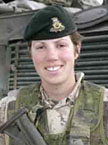 UPDATE. WEDNESDAY, MAY 17, 11 PM ET. The duly elected federal Parliament did not get around to voting on the Harper minority government’s sudden surprise motion to extend Canada’s current mission in Afghanistan for another two years until shortly after 10 PM Ottawa time this evening. But in the end, as the Globe and Mail editors have put it, the motion did “squeak through” the House, 149 Yeas to 145 Nays.
UPDATE. WEDNESDAY, MAY 17, 11 PM ET. The duly elected federal Parliament did not get around to voting on the Harper minority government’s sudden surprise motion to extend Canada’s current mission in Afghanistan for another two years until shortly after 10 PM Ottawa time this evening. But in the end, as the Globe and Mail editors have put it, the motion did “squeak through” the House, 149 Yeas to 145 Nays.
So in one sense Stephen Harper’s clever strategy here did work in the end. It did take the issue of extending the Canadian mission from February 2007 to February 2009 off the table of current official debate in Canada’s capital city.
Yet, perhaps somewhat ironically, in another more deeply political sense it may not have worked quite as well as planned. Interim Liberal leader Bill Graham’s shrewd enough last-minute decision to let his members treat the motion as a free vote meant that he and about two dozen of his colleagues could vote with the government, and evade any overly controversial defeat of the Harper Conservatives’ extension scheme.
At the same time, the great majority of Liberal MPs finally did vote against the motion – including such current Liberal leadership candidates as Joe Volpe, Stephane Dion, Maurizio Bevilacqua, Ken Dryden, Carolyn Bennett, and Hedy Fry. So Mr. Harper’s clever strategy has not quite managed to also defang continuing unease about Afghanistan among the Canadian people as a potential new Liberal issue in the next federal election campaign.
At least a bit better Afghanistan debate than the last one …
 If you managed to stick with most of the six-hour televised debate on the Canadian Parliamentary Access Channel (CPAC), give yourself a silver star. And if you don’t have any handy, you can still take some satisfaction from the thought that this was at least a somewhat better Afghanistan debate in Parliament than the one last month.
If you managed to stick with most of the six-hour televised debate on the Canadian Parliamentary Access Channel (CPAC), give yourself a silver star. And if you don’t have any handy, you can still take some satisfaction from the thought that this was at least a somewhat better Afghanistan debate in Parliament than the one last month.
A number of female MPs in particular made strong contributions. And this seemed to fit with some very sad news from earlier in the day. (Capt. Nichola Goddard “was killed Wednesday during an intense firefight with Taliban insurgents near Kandahar, marking what is believed to be the first death of a Canadian woman in combat in more than 60 years.”)
 Bonnie Brown (Liberal, Oakville, Ontario) nicely summarized key objections to the Harper government motion among the Liberals who did not support it. Canadians, she said, were prudent people who believe in taking big decisions carefully. The question of extending Canada’s commitments in Afghanistan beyond the current February 2007 deadline is complex and tricky. The other key NATO allies in this context, in the UK and the Netherlands, have taken much more time on their versions of the same issue than the Harper government has allowed for. Many Canadian people are bound to wonder: “Why the rush?”
Bonnie Brown (Liberal, Oakville, Ontario) nicely summarized key objections to the Harper government motion among the Liberals who did not support it. Canadians, she said, were prudent people who believe in taking big decisions carefully. The question of extending Canada’s commitments in Afghanistan beyond the current February 2007 deadline is complex and tricky. The other key NATO allies in this context, in the UK and the Netherlands, have taken much more time on their versions of the same issue than the Harper government has allowed for. Many Canadian people are bound to wonder: “Why the rush?”
Dawn Black (New Democrat, New Westminster-Coquitlam, British Columbia) and Alexa McDonough (New Democrat, Halifax, Nova Scotia) both raised pointed questions that the Harper government is largely evading. (Why, e.g., are current NATO plans for Afghanistan still subjects of great controversy within NATO itself?)
 Francine Lalonde (Bloc Quebecois, La Pointe-de-l’le, Quebec) – a history teacher by profession, who has clearly made an admirable study of recent documentation on conditions down on the ground in Afghanistan – reviewed the many very real and profound challenges of dealing effectively with the country’s vast troubles today. And she rightly enough urged that the Harper government’s current plans (and/or those of NATO’s current International Security Assistance Force) do very little to address these challenges head on, in any practical way.
Francine Lalonde (Bloc Quebecois, La Pointe-de-l’le, Quebec) – a history teacher by profession, who has clearly made an admirable study of recent documentation on conditions down on the ground in Afghanistan – reviewed the many very real and profound challenges of dealing effectively with the country’s vast troubles today. And she rightly enough urged that the Harper government’s current plans (and/or those of NATO’s current International Security Assistance Force) do very little to address these challenges head on, in any practical way.
A general impression listening to the debate on both sides was that almost all Members of Parliament in Canada today rather warmly support doing something to help the current Karzai regime in Afghanistan grapple effectively with its vast challenges. What they disagree about is just what this ought to be, if it is going to succeed where past efforts have failed. There were moments in the debate on Wednesday, May 17 when it seemed that further parliamentary discussion just might help come up with better answers. Even if this unhappily does seem much less likely to happen now.
On balance, an unimpressively bombastic Conservative performance?
 Fortunately for Stephen Harper’s Conservatives, perhaps, probably not a great many Canadian voters were watching the May 17 Afghanistan debate in the Ottawa Parliament.
Fortunately for Stephen Harper’s Conservatives, perhaps, probably not a great many Canadian voters were watching the May 17 Afghanistan debate in the Ottawa Parliament.
The Harper government’s only real arguments continue to be that real men (and women) don’t “cut and run” when the going gets tough. And people who don’t agree with Stephen Harper (and/or NATO’s new ISAF plans) on the details of moving ahead are just failing in their duty to support the troops on the ground.
These arguments were trotted out again and again by various Conservative spokespersons with much bombast. And they quickly began to sound like the empty-headed and bullying broken record they are. (The Liberals who finally supported the government’s position at least took some pains to avoid the bullying bombast.)
As the Associated Press in the US reported a few months ago now, when the current shift in arrangements for Afghanistan first set in: “The American mission to bring order to this unruly country is being handed to a multinational force led by the NATO alliance … NATO’s ambitious mission could inject the flagging European-North American alliance with a sense of purpose and also might take the heat off Washington, seen in this region as too eager to fight Muslims.”
 One big point the Harper government still seems quite reluctant to address is that it is not going to help anyone if Canada (and/or the UK and the Netherlands for that matter) just takes over the reputation of being “too eager to fight Muslims.” This has arguably become something that is only inflaming what does appear to be an increasingly inflamed Taliban insurgency.
One big point the Harper government still seems quite reluctant to address is that it is not going to help anyone if Canada (and/or the UK and the Netherlands for that matter) just takes over the reputation of being “too eager to fight Muslims.” This has arguably become something that is only inflaming what does appear to be an increasingly inflamed Taliban insurgency.
Fortunately again, it does often enough appear that the Canadian troops on the ground have a better grasp of the point here than their ultimate political masters back home.
If someone could somehow manage to convey this to the Canadian people, perhaps the opinion polls would not look quite so glum. In any case, Canadian troops will now be staying on in Afghanistan until February 2009. And Prime Minister Harper will no doubt take some comfort from that. (Even if it finally does not help him win a majority government in the next federal election – to the extent that he does still seem to be hoping it will.)
May 16: SURPRISE AFGHANISTAN DEBATE IN OTTAWA .. another win for crafty new Conservatives?
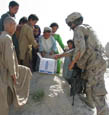 The sudden news that there will be a debate in Parliament on extending Canada’s current military commitment in Afghanistan, on Wednesday, May 17, highlights the quite crafty style of the new Tory oligarchy in Ottawa. And makes you wonder just how far it can go.
The sudden news that there will be a debate in Parliament on extending Canada’s current military commitment in Afghanistan, on Wednesday, May 17, highlights the quite crafty style of the new Tory oligarchy in Ottawa. And makes you wonder just how far it can go.
The official spin is that “extending the mission eases any concerns the NATO-led International Security Assistance Force (ISAF) – which is taking over the US-led mission in perilous southern Afghanistan – may have over Canada’s commitment.” According to CTV’s Ottawa bureau chief Robert Fife: “They want some certainty from Canada.”
Yet as Mr. Fife has also noted: “More importantly, it’s about politics. The Conservatives are worried about the Liberal leadership race; they’re afraid that the next leader may pull the plug on Liberal support for Afghanistan, so they want to get it over now.”
The politics would also seem to go still deeper. According to the CBC, the debate will start on Wednesday, at 3PM EDT. It will last six hours, and be followed by a vote at 9:15 PM on extending the mission – from the current February 2007 deadline to February 2009. On the face of things, the Liberals will likely enough vote for the Harper minority government’s extension proposal in the end. And that ought to remove the issue from their armory in the next federal election, for which Mr. Harper has already launched his clever campaign.
BRIEF UPDATE: WEDNESDAY, MAY 17, 3 PM EDT. As what should prove a quite heated debate in Parliament gets underway, both the Bloc Quebecois and the New Democrats have indicated that they will be voting against the Harper government’s motion for a two-year extension of Canada’s current Afghanistan commitment. Liberal interim leader Bill Graham has indicated that his party will treat the motion as a free vote, in which its MPs can vote as their conscience instructs.
As it turns out, current indications are that substantial numbers of Liberal MPs will probably be voting against the motion. And whether enough will vote with the minority Conservative government to get the motion through remains unclear. There is some prospect that the motion will actually be defeated around 9:15 Ottawa time this evening – with at the moment somewhat unclear implications for the longer-term future of Canada’s Afghanistan commitment. So today’s debate ought to be interesting, at the very least. The counterweights editors will post a more detailed report later this evening, after the vote has taken place. Meanwhile, our earlier more detailed report follows below.
Is there a case for voting against extending the commitment … right now?
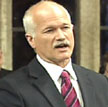 As explained in the Vancouver Sun, according to opinion polling data public support for the current Canadian mission in Afghanistan “has wavered in recent weeks.” But the “rush for a debate” nonetheless “puts opposition parties in a difficult position.”
As explained in the Vancouver Sun, according to opinion polling data public support for the current Canadian mission in Afghanistan “has wavered in recent weeks.” But the “rush for a debate” nonetheless “puts opposition parties in a difficult position.”
The Liberals, “who sent Canadian soldiers to Afghanistan shortly after Sept. 11, 2001, are in the midst of a leadership race and are deeply divided on the issue.” They seem “unwilling to have a vote on extending the mission at all.” The New Democrats “are most likely to oppose redeployment.” (Although “NDP foreign affairs critic Alexa McDonough has just returned from Afghanistan and will present a preliminary report on the Canadian mission to her caucus on Wednesday.”) And the Bloc Quebecois is “not keen on having an early vote on the mission, as they have not drawn up an official position on the issue.”
As noted above, the present lay of the land would appear to suggest that at least the Liberals will finally feel compelled to vote for the Harper government’s extension proposal. And this may well be the way the universe will unfold at 9:15 PM on Wednesday, May 17. But there also seems a case for arguing that, although the previous Liberal government did commit Canadian troops to the ISAF mission in Afghanistan up to February 2007, it is still too early to extend this commitment for another two years – before seeing just how well the new ISAF strategy is working out on the ground.
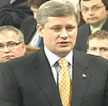 As a report in the Toronto Star has explained, “Prime Minister Stephen Harper has repeatedly said that Canada will not cut and run’ from the war-torn country and signaled Canadians could be there for years yet … We are bringing humanitarian assistance to the Afghan people and we are assisting the Afghan forces with the building of security in their own country,’ he said in the Commons last month. We are going to be there until we succeed in these goals.'”
As a report in the Toronto Star has explained, “Prime Minister Stephen Harper has repeatedly said that Canada will not cut and run’ from the war-torn country and signaled Canadians could be there for years yet … We are bringing humanitarian assistance to the Afghan people and we are assisting the Afghan forces with the building of security in their own country,’ he said in the Commons last month. We are going to be there until we succeed in these goals.'”
Yet, despite recurrent Conservative and other sophistry to the contrary, military commitments are not strictly necessary for “humanitarian assistance.” There is growing evidence, to say the least (and from both Afghanistan and neighbouring Iraq) that the presence of foreign and especially Western troops will ultimately only hinder “the Afghan forces with the building of security in their own country.” And neither Mr. Harper nor anyone else has given the Canadian people any serious indication of just what might constitute practical evidence of success in achieving “these goals.”
It probably is true enough, as many on all sides seem to allow, that Canada does not want to show any backing away from its support of whatever realistic and laudable objectives the international community might have in Afghanistan. But if Canadian soldiers are going to risk their lives in support of the international community, then Canadian political leaders ought to have some say in ensuring that what they are risking their lives for makes sense. As opinion polls continue to show, many among the Canadian people remain unpersuaded that the international community has got its act together effectively.
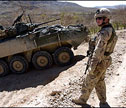 From this angle, it would seem reasonable for even the Liberals to argue that while they are staunchly committed to the current Canadian troop allocations to February 2007 (that they themselves made while they were in government), it is premature to extend this commitment up to February 2009 at the present time. Let’s wait a bit and see just how well the new ISAF strategy is working out – and just how much progress the Karzai regime in Afghanistan is making with its own domestic security arrangements. Whatever the faceless ISAF bureaucrats in Europe may or may not be saying in fact, there is no clear need for Canadians to decide on extending their current commitments as early as Wednesday, May 17, 2006.
From this angle, it would seem reasonable for even the Liberals to argue that while they are staunchly committed to the current Canadian troop allocations to February 2007 (that they themselves made while they were in government), it is premature to extend this commitment up to February 2009 at the present time. Let’s wait a bit and see just how well the new ISAF strategy is working out – and just how much progress the Karzai regime in Afghanistan is making with its own domestic security arrangements. Whatever the faceless ISAF bureaucrats in Europe may or may not be saying in fact, there is no clear need for Canadians to decide on extending their current commitments as early as Wednesday, May 17, 2006.
Jaded observers of Canadian politics have reasons to doubt that the Liberal official opposition in Parliament has what it takes to stand up for such a brave position. But how refreshing it would be if this proved wrong. For the moment, all Mr. Harper is offering the Canadian people is the same empty-headed emotional bullying that has finally got George W. Bush into trouble in the USA today. And the hapless Liberals in Canada are now in the same position as the hapless Democrats down south. Meanwhile, reports continue to surface that Osama bin Laden is actually hiding out in Pakistan and not Afghanistan. Some Canadian people may reasonably wonder: Why isn’t the international community sending troops there?
Will Stephen Harper finally prove too clever by half … like Brian Mulroney?
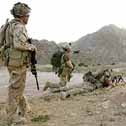 The sudden surprise of the Wednesday, May 17 Afghanistan extension debate in Canada’s federal Parliament is probably also giving some Canadian people food for second thought about just what their new Prime Minister Stephen Harper stands for. Those who voted for Mr. Harper because they thought he would bring something more high-minded to the old neo-Machiavellian Liberal corridors of power in Ottawa at least ought to be thinking again.
The sudden surprise of the Wednesday, May 17 Afghanistan extension debate in Canada’s federal Parliament is probably also giving some Canadian people food for second thought about just what their new Prime Minister Stephen Harper stands for. Those who voted for Mr. Harper because they thought he would bring something more high-minded to the old neo-Machiavellian Liberal corridors of power in Ottawa at least ought to be thinking again.
Mr. Harper is no doubt proving that he is indeed a clever tactician. But he is not showing much real respect for the Canadian people, who, as the polling data continue to suggest, remain quite divided over just what the country ought to be doing in Afghanistan.
In this as in other contexts, Mr. Harper’s style sometimes seems reminiscent of the too-clever-by-half habits of former Conservative Prime Minister Brian Mulroney. But it took a while for the Canadian people to digest just what Mr. Mulroney was all about. And in the meantime he won two elections.
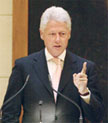 Given that you can actually win a majority of seats in the federal Parliament at Ottawa with even a bit less than 40% of the cross-Canada popular vote, Mr. Harper’s current cleverness may even win him a majority government at some point in the not too distant future.
Given that you can actually win a majority of seats in the federal Parliament at Ottawa with even a bit less than 40% of the cross-Canada popular vote, Mr. Harper’s current cleverness may even win him a majority government at some point in the not too distant future.
Many Canadian people do not pay a lot of attention to federal politics. But when they did catch on to the ultimate hollowness of Mr. Mulroney’s clever tactics they turned against him passionately. It could take some similar length of time for what may or may not be the hollowness of Mr. Harper’s clever tactics to stir some similar revulsion, coast to coast to coast.
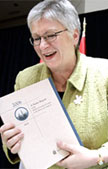 Meanwhile, on Wednesday, May 17 the Parliament of Canada will be asked to vote on the motion “that this House support the government’s two-year extension of Canada’s diplomatic, development, civilian police and military personnel in Afghanistan and the provision of funding and equipment for this extension.”
Meanwhile, on Wednesday, May 17 the Parliament of Canada will be asked to vote on the motion “that this House support the government’s two-year extension of Canada’s diplomatic, development, civilian police and military personnel in Afghanistan and the provision of funding and equipment for this extension.”
And when Mr. Harper responds to criticism that he is being too hasty in so suddenly springing this motion on the democratically elected MPs with “Members of this house have had five years to decide what their position is on this mission,” he is showing scant respect for the plain common sense of those voters who actually have been following Canada’s changing role in Afghanistan since 2001 carefully. Even the Liberals at their worst, some might reasonably argue, never stooped quite so low as that.
(Or, if you like, “corruption” in politics can come in many different forms. And as was wisely said long ago and far away “all power tends to corrupt” – even, apparently, when you are just leading a minority government.)

